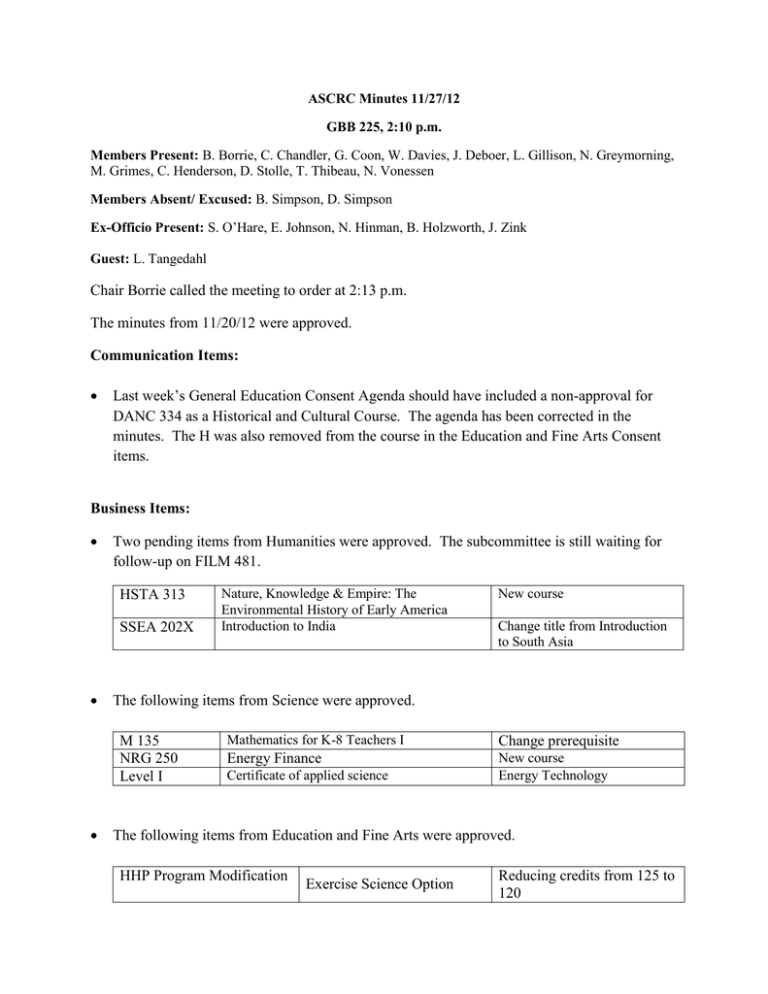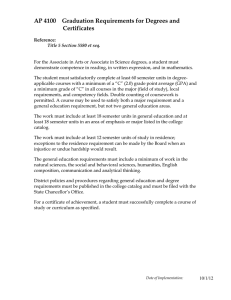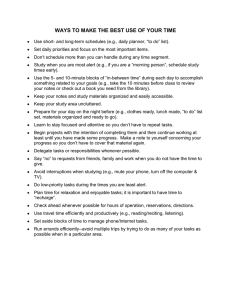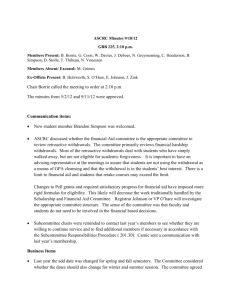ASCRC Minutes 11/27/12 GBB 225, 2:10 p.m. Members Present: Members Absent/ Excused:
advertisement

ASCRC Minutes 11/27/12 GBB 225, 2:10 p.m. Members Present: B. Borrie, C. Chandler, G. Coon, W. Davies, J. Deboer, L. Gillison, N. Greymorning, M. Grimes, C. Henderson, D. Stolle, T. Thibeau, N. Vonessen Members Absent/ Excused: B. Simpson, D. Simpson Ex-Officio Present: S. O’Hare, E. Johnson, N. Hinman, B. Holzworth, J. Zink Guest: L. Tangedahl Chair Borrie called the meeting to order at 2:13 p.m. The minutes from 11/20/12 were approved. Communication Items: Last week’s General Education Consent Agenda should have included a non-approval for DANC 334 as a Historical and Cultural Course. The agenda has been corrected in the minutes. The H was also removed from the course in the Education and Fine Arts Consent items. Business Items: Two pending items from Humanities were approved. The subcommittee is still waiting for follow-up on FILM 481. HSTA 313 SSEA 202X New course Change title from Introduction to South Asia The following items from Science were approved. M 135 NRG 250 Level I Nature, Knowledge & Empire: The Environmental History of Early America Introduction to India Mathematics for K-8 Teachers I Change prerequisite Energy Finance New course Energy Technology Certificate of applied science The following items from Education and Fine Arts were approved. HHP Program Modification Exercise Science Option Reducing credits from 125 to 120 MAR 305 MAR 323 MAR 333 3D Animation I 3D Motion Design 3D Animation II New course change number from 222 New course The following items from Forestry and Biomedical Sciences were approved. NRSM 426 CCS Program Modification Climate and Society Minor, Climate Change Studies new course changes in course designation, repeatability, numbering, title; catalog wording After an extended discussion HC 294, Advocate Leader Seminar was approved. Concern was expressed as to continued funding for this class, as well as the relationship of assessment criteria to academic learning outcomes. It did not have unanimous approval from the Business and Journalism Subcommittee. Assistant Vice President O’Hare informed the committee that the Provost convened a Working Group to investigate the Early Alert system. The membership will include representatives from the Faculty, students, academic advisors and the administration. Professor Gillison volunteered as the representative from ASCRC. Consideration of the credit/no credit catalog language was postponed. The Registrar wants to make sure that all information available to students is consistent, so it is taking more time to draft. It should be available in a couple of weeks. The draft will be sent once available for input, but will not be available for ASCRC until the first meeting of the spring semester. A draft prerequisite guide should be available soon. It will be a two to three page technical manual that explains the programing logic in Banner and will include good and bad examples of prerequisites. A worksheet may be helpful to clarify the guide for faculty. ASCRC may consider establishing standards for prerequisite catalog language at a later date. The technical consultant on the pre-requisite project, Allan Mozingo, will submit a final report with recommendations at the end of his contract. The committee agreed to review spring changes to prerequisites with the availability of the guide. The deadline memo will need to be available for next week’s Faculty Senate meeting. The memo from last year will serve as a template and be sent to Assistant VP O’Hare and others for refining. The deadline for submission will be early spring semester, similar to last year to allow the Registrar’s Office to enter the changes prior to fall enrollment. There was a discussion of the current Early Alert system in order to provide feedback to the Provost’s Working Group. It was suggested that the alert message goes out too late in the semester and that typically only about 30% of faculty participate which may be misleading to students (since the Early Alert system is therefore not providing alerts for courses they may be failing). Some faculty may consider the alert redundant and duplicative of grading and others may not have had formal assessment at that point of the semester. Faculty members frequently do not hear from the students that have received an alert, so do not know whether it is having a positive impact. A concern was expressed that students often do not check their umontana email account. It was suggested the system requires a lot of work, but has little demonstrated results. Perhaps it is not doing what it is designed to do? There are other student information systems that allow faculty to initiate the alert and to identify the type of deficiency that may warrant investigation. It was noted that some students are reluctant to drop a course even when they are aware of poor performance due to financial aid implications. This is especially relevant for veterans who may be required to pay back benefits for a W but not an F. One suggestion was to utilize an approach similar to that used with student athletes and Army reservists where close monitoring and mentoring of academic performance is available. Concern about athletes’ eligibility provides an additional incentive to be attentive to academic performance. Thirty percent of the general student body do not yet have a faculty advisor, as they are undeclared. Students active in the Army Reserves also have to submit progress reports three times a semester. Student mentors are utilized in some majors. Good and Welfare Professor Gillison informed ASCRC that Senators from the Modern and Classical Languages Department will likely bring a petition before the Faculty Senate at the December meeting to consider the language requirement motion proposed last academic year by the General Education Committee. The meeting was adjourned at 4:00 PM.



